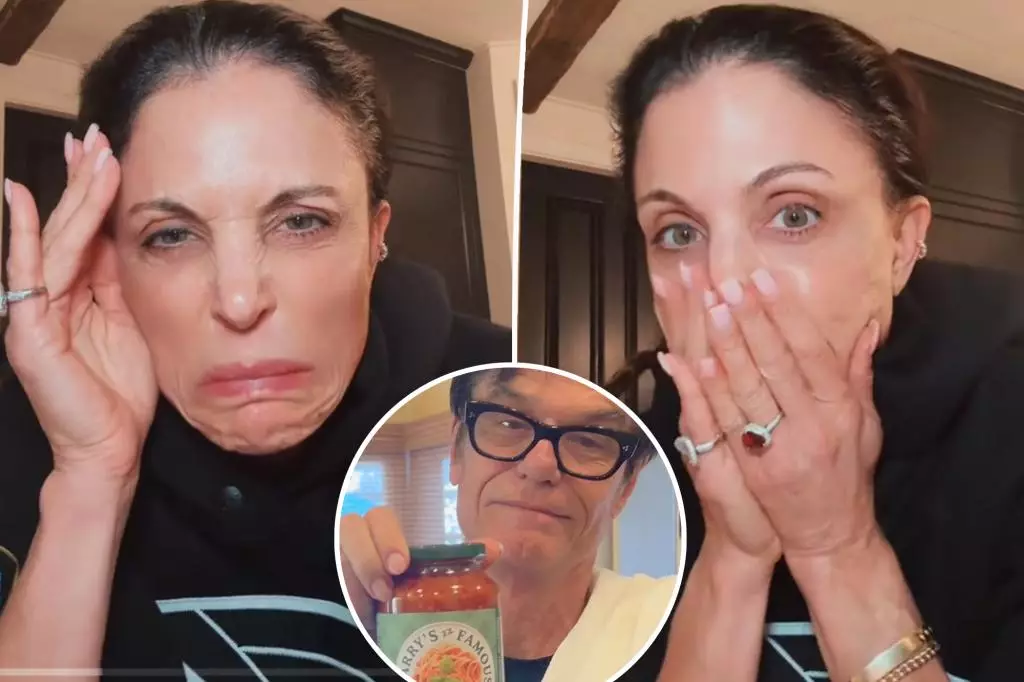The culinary world is often fraught with differing opinions, but when a celebrity chef’s product faces criticism from a widely recognized figure, it instantly becomes a spectacle. Recently, Bethenny Frankel, the former star of “The Real Housewives of New York City,” offered her unvarnished feedback on Harry Hamlin’s Rosemary Red Wine Sauce during a blind taste test that quickly went viral. With social media as the backdrop, Frankel’s harsh review sparked discussions on authenticity, taste, and the significance of celebrity branding in the food industry.
Upon receiving a well-presented picnic basket containing Harry’s sauce, Frankel conducted her taste test and was quick to provide her thoughts. While she praised the well-known Rao’s pasta sauce as “nice,” the moment she sampled Hamlin’s offering, her facial expressions told a different story. With a visible grimace, she declared, “No! I don’t know what that is!” It was a moment that caught the attention of many, primarily because it was a blend of raw honesty and great theatre—a combination that often garners views and shares in the social media realm.
The Elements of Flavor
Frankel’s critique centered on what she perceived as overpowering flavors in Hamlin’s sauce, specifically the dominating notes of vinegar and red wine. This critique isn’t merely a reflection of personal taste but rather opens up a dialogue about flavor profiles and consumer expectations. Many pasta sauces boast about their rich, layered flavors, promising to elevate a simple meal into a gourmet experience. Hamlin’s sauce, by comparison, struggled to meet that expectation in Frankel’s opinion. The bluntness of her remarks—”business is hard,” she cautions Hamlin—highlights that even seasoned experts can falter when attempting to balance unique ingredients in a product meant for mass consumption.
In a subsequent video, after receiving feedback from Amelie Gray Hamlin suggesting that Frankel cook the sauce before forming an opinion, the entrepreneur heated up the sauce to give it a second chance. To her dismay, even after cooking, Frankel reported that it tasted “worse” and compared its flavor to “not great red wine.” This reiteration of her previous critique solidified her stance that Hamlin’s sauce, despite its intended gourmet appeal, did not resonate well with her palate.
Harry Hamlin is not just a celebrity; he’s an actor who has transitioned into various realms, including cooking. His sauce contains a promise of “love and more love,” a marketing line that speaks to the heart of culinary endeavors more often than not. In an industry where the name and reputation of the creator play a substantial role in consumer acceptance, Hamlin’s venture into food production raises important questions about what truly captures the market’s attention. Frankel’s review reveals an interesting dynamic: a product can hold star power based solely on the individual’s reputation, but that does not inherently guarantee quality or appeal.
Despite his efforts to create a sauce that reflects his culinary philosophy, the negative feedback illustrates a broader reality—the food industry is unforgiving. The complexities of balancing personal taste with a product aimed at a wider audience mean that not every culinary venture will resonate. With numerous other products on the market, consumers often wield their opinions like weapons, laying waste to those that fail to make the grade.
Frankel’s apology amid her review is emblematic of a shifting culture surrounding food critiques. Culinary influencers and commenters are now realizing the power of their platforms, opting for transparency even at the risk of hurting feelings. Humility and honesty play critical roles in their narratives. While her delivery may appear harsh, it reflects a deep understanding of quality expectation among food enthusiasts.
The incident has sparked conversations not only about Hamlin’s culinary offering but also about the implications of taste testing in the age of social media. It raises a question: how important is it for celebrity culinary ventures to maintain their reputation when faced with unwelcoming critiques? As consumers evolve, so do their palates, and not every venture will find a welcoming audience.
This culinary clash between Bethenny Frankel and Harry Hamlin serves as a reminder that in the world of food, passion, authenticity, and an understanding of consumer expectations are paramount. Whether one enjoys Hamlin’s sauce or not, the discourse surrounding it highlights the power of honest commentary in shaping the culinary landscape.

